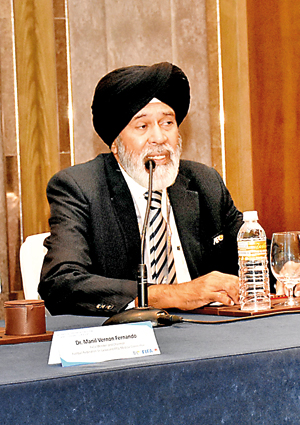‘Cheapest and most effective way to prevent doping is education’ – Dr. Gurcharan Singh
The football world reeled in shock when Argentine superstar Diego Maradona was kicked out of the 1994 World Cup in Los Angeles after he tested positive for five variants of ephedrine, a stimulant banned by soccer’s international governing body.

Dr. Gurcharan Singh, addressing the gathering flanked by FFSL officials in Colombo
The suspension marked the third time a player has been thrown out of World Cup play for violating doping regulations. In 1974, Ernest Jean-Joseph of Haiti was suspended for a substance that was not publicly identified, and in 1978, Willie Johnston of Scotland was sent home for using another stimulant, fencamfamine.
Maradona was handed a worldwide suspension by FIFA from April 6, 1991, to June 30, 1992, after he tested positive for cocaine while playing for Napoli of the Italian League.
However, the use of stimulants or performance enhancing drugs in football is not rampant as it appears with only insignificant percentage of 0.4 percent testing positive from over 30,000 players tested last year.
“The majority of them is due to recreational drugs they have taken like marijuana or cocaine and it becomes positive. Some of these players take not to cheat but they take it for some other reason and it becomes positive. But unfortunately they get banned. Others which become positive is because of supplements. That is why we say no to supplement. And it’s the responsibility of the player if you take a supplement. It affects you adversely. Education is key. That is what we wanted to do,” said Dr. Gurcharan Singh who was in Colombo for the AFC (Asian Football Confederation) Medical Officers and FIFA Doping Control Officers course held for the first time in Sri Lanka last week.
“This course is held every four years for participants to refresh and update their knowledge and to incorporate a standardised care to footballers in Asia. We have been entrusted by the AFC to do our duties at the highest standard by providing our footballers with the best care while also optimising their performance. In this course, all participants will learn about the standard guidelines which we have to practice in unity and doctrine,” stated Dr Singh, the AFC Deputy Chairperson of the Medical Committee and Member of the FIFA Medical Committee.
“The cheapest and the most effective way to prevent doping is education. You have to educate the players from a younger age group. So you need doping control officers to conduct education classes to the players as well to the officials and this education starts right at the youth level. Primarily there is no place for supplements in football. It is a team event where a players runs 30 metres or maximum 50 metres at one go. He does 150 to 200 sprints in one whole match. So supplements do not play a role. It is not an individual event. All this boils down to education. It is a low cost high output activity,” he summed up.
Among some of the topics covered during the course included the challenges faced by medical officers when travelling with teams and tackling the extreme environmental issues in Asia. Participants also heard from FIFA their fight against doping in football while receiving an update on the World Anti-Doping Agency (WADA) code. There were 60 participants including 15 doctors from Sri Lanka at this confab.
“It is a good opportunity to update about sports medicine, doping and the WADA code. Educaton about anti-doping, how to do doping control, how to do urine samples, blood samples and also work with local authorities on nutrition supplements and abuse of it. Lot of things are happening in sport. Doping is not reported but there is a considerable amount of doping in all the sports in Sri Lanka. This is the mechanism we can establish to arrest it,” said Jaswar Umar, secretary of the Football Federation of Sri Lanka (FFSL).
“As Dr. Guru said no supplement are required to play football. There is scientific evidence behind this. These are messages we need to tell players. Don’t take supplement because there is no use,” he added.
“What we have after studying about doping in almost all AFC competitions is that there is no systemic doping in football because it is a team event. It is very difficult to cheat by all the players. When 11 players play, one individual cannot affect the result of the game. Most of the time when we do find a positive result, it is because a player has taken a supplement without knowing that it is a banned substance. If you are found to be positive, it’s your responsibility. That’s why education becomes very important in telling players that supplements do not play a role in the performance,” reiterated Dr Manil Vernon Fernando, chairman of FFSL’s medical committee since 2017 and also a member of FIFA medical committee.
“It is very difficult for us to maintain the standards across all our tournaments in Sri Lanka. So we need a panel of doctors. That’s what we are trying to create. So we will have 15 doctors who have gone through this accreditation process. They will know what standards are required internationally. We had doctors who were qualified in sports medicine but none other than for Dr Lal Ekanayake and myself who have attended this type of programme,” said Dr Fernando who has been national team physician for several years.
“If you take cycling and athletic, I believe there is a problem with doping. In football we don’t see a problem. Ofcourse medical educaton and education regarding to doping we have to increase in football,” he added.


